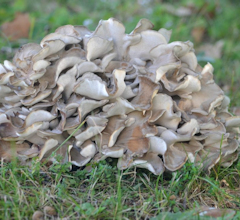Maitake
 Maitake is a first-rank edible mushroom with excellent aroma and texture. Its scientific name is Grifola frondosa, and Maitake is its Japanese name. Maitake grows in temperate zones and is incredibly popular in Japan. It also grows in Europe and North America. Maitake is mostly harvested from the wilderness and thrives on the lower parts of the trees, especially oak trees. It has both culinary and health usages.1
Maitake is a first-rank edible mushroom with excellent aroma and texture. Its scientific name is Grifola frondosa, and Maitake is its Japanese name. Maitake grows in temperate zones and is incredibly popular in Japan. It also grows in Europe and North America. Maitake is mostly harvested from the wilderness and thrives on the lower parts of the trees, especially oak trees. It has both culinary and health usages.1
Health Benefits of Maitake
- Anti-Cancer
Many mushrooms are known for their potent anti-cancer activity, and Maitake is one of them. It can kill cancer cells through activation of macrophages, T-cells, natural killer cells, and much more. It may also modulate immunity so that the immune system can better identify cancer cells. There is some evidence that Maitake may even alter tumour gene expression, thus reducing the aggressiveness of cancer cells. Studies show that polysaccharides from the Maitake play an important role in suppressing cancer cells.2,3 - Immuno-Modulatory
Studies show that Maitake not only stimulates immunity, it may also modulate it. This means that Maitake can help not only fight infections and cancer but may also have a role in managing allergies and autoimmune conditions.4 - Anti-Inflammatory and Antioxidant
Experimental studies show that Maitake may inhibit the COX-2 enzyme, and therefore may help reduce inflammation. Maitake also has many antioxidant compounds. It means that Maitake may have numerous health benefits especially since inflammation is present in almost all types of illnesses. Like many other medicinal mushrooms, Maitake may prevent chronic ailments and have antiaging properties.5 - Anti-Diabetes
Diabetes is a lifestyle disorder that can be managed well in its early stages with exercise, dietary changes, and supplements. Moreover, natural remedies have numerous other health benefits. Experimental studies confirm that Maitake has a glucose-lowering effect meaning that its use may be particularly beneficial for those living with prediabetes, or those with mild diabetes. In more advanced diabetes, Maitake may be used alongside traditional medical therapy.6 - Blood Pressure-Lowering Effect
Maitake has mild Angiotensin-Converting-EnzymeACE inhibitory activity. This means that using Maitake may help lower blood pressure. Maitake may also be beneficial for vascular health and may also have nephroprotective activity (helping to preserve the kidney function). Studies show that most people are not able to control hypertension with medical drugs satisfactorily, therefore using Maitake supplements along with drug therapy, can be beneficial.7,8 - Anti-Atherosclerotic
Studies show that Maitake has a mild anti-atherosclerotic effect. This means that it may prevent the formation of plaque, stiffening of blood vessels, and lower the risk of hypertension. Maitake may have a role in preventing heart diseases and stroke; however, more studies are needed to confirm such benefits.9
Side Effects of Maitake
There are no known side effects of Maitake, and it is safe to consume as a food or health supplement. Even its prolonged use does not seem to cause any harmful effects. It is advised that people taking blood sugar-lowering drugs use Maitake cautiously, as it’s consumption may enhance their impact. Studies also show that Maitake may increase the white blood cell count, which is not a reason for concern. However, asymptomatic increase in eosinophils (a type of disease-fighting white blood cells) due to Maitake intake may sometimes interfere with diagnostic tests, particularly those done for allergies or certain autoimmune conditions.10
Properties
- Allergies4,5
- Anti-Aging2,3
- Anti-Inflammatory4
- Antioxidant5
- Blood Pressure – Reduction7,8
- Blood Tonic1
- Cancer Prevention2,3
- Diabetes / Blood Sugar6
- Heart Support / Health7,8,9
- Hypertension7,8
- Immune Booster4
- Kidney Support7,8
References
- Mizuno T, Zhuang C. Maitake, Grifola frondosa: Pharmacological effects. Food Reviews International. 1995;11(1):135-149. doi:10.1080/87559129509541024
- Antitumor Activity Exhibited by Orally Administered Extract from Fruit Body of Grifola frondosa (Maitake). Chemical & Pharmaceutical Bulletin. 1988;36(5):1819-1827. doi:10.1248/cpb.36.1819
- Nanba H, Hamaguchi A, Kuroda H. The Chemical Structure of an Antitumor Polysaccharide in Fruit Bodies of Grifola frondosa (Maitake). Chemical & Pharmaceutical Bulletin. 1987;35(3):1162-1168. doi:10.1248/cpb.35.1162
- Wu M-J, Cheng T-L, Cheng S-Y, Lian T-W, Wang L, Chiou S-Y. Immunomodulatory Properties of Grifola frondosa in Submerged Culture. J Agric Food Chem. 2006;54(8):2906-2914. doi:10.1021/jf052893q
- Zhang Y, Mills GL, Nair MG. Cyclooxygenase Inhibitory and Antioxidant Compounds from the Mycelia of the Edible Mushroom Grifola frondosa. J Agric Food Chem. 2002;50(26):7581-7585. doi:10.1021/jf0257648
- Anti-diabetic Activity Present in the Fruit Body of Grifola frondosa (Maitake). I. Biological & Pharmaceutical Bulletin. 1994;17(8):1106-1110. doi:10.1248/bpb.17.1106
- Choi HS, Cho HY, Yang HC, Ra KS, Suh HJ. Angiotensin I-converting enzyme inhibitor from Grifola frondosa. Food Research International. 2001;34(2):177-182. doi:10.1016/S0963-9969(00)00149-6
- Blood Pressure-Lowering Activity Present in the Fruit Body of Grifola frondosa (Maitake). I. Chemical & Pharmaceutical Bulletin. 1988;36(3):1000-1006. doi:10.1248/cpb.36.1000
- Mori K, Kobayashi C, Tomita T, Inatomi S, Ikeda M. Antiatherosclerotic effect of the edible mushrooms Pleurotus eryngii (Eringi), Grifola frondosa (Maitake), and Hypsizygus marmoreus (Bunashimeji) in apolipoprotein E–deficient mice. Nutrition Research. 2008;28(5):335-342. doi:10.1016/j.nutres.2008.03.010
- Wesa KM, Cunningham-Rundles S, Klimek VM, et al. Maitake mushroom extract in myelodysplastic syndromes (MDS): a phase II study. Cancer Immunol Immunother. 2015;64(2):237-247. doi:10.1007/s00262-014-1628-6
